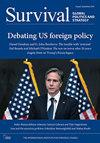Tough Lessons for UN Peacekeeping OperationsThe Political Economy of Civil War and UN Peace Operations, Mats Berdal and Jake Sherman (eds). Abingdon: Routledge, 2023. £34.99/$44.95. 350 pp.
IF 1.9
3区 社会学
Q2 INTERNATIONAL RELATIONS
引用次数: 0
Abstract
AbstractWith the future of UN peacekeeping once again up for debate, it’s worth reflecting on the lessons of the past 30 years. UN operations in the Central African Republic, the Democratic Republic of the Congo, Mali and elsewhere have had to contend with complex local and regional systems of power and governance that have major influences on missions’ prospects for success. In The Political Economy of Civil War and UN Peace Operations, Mats Berdal and Jake Sherman pull together an excellent set of essays that identify the signal lessons of UN peacekeeping in dealing with these systems, and offer a credible set of policy prescriptions. The book makes a compelling case for a better understanding of the political economy of conflict, and less expansive mission mandates that are attuned to the local context.Key words: Africacounter-insurgencygovernanceorganised-crime networkspolitical economyUN peacekeepingUN reformUnited Nations Notes1 See UN Security Council, ‘Resolution 2666’, 20 December 2022, paras 38–42, https://www.securitycouncilreport.org/atf/cf/%7B65BFCF9B-6D27-4E9C-8CD3-CF6E4FF96FF9%7D/S_RES_2666.pdf; and UN Security Council, ‘Resolution 2659’, 14 November 2022, para 58, https://documents-dds-ny.un.org/doc/UNDOC/GEN/N22/691/48/PDF/N2269148.pdf?OpenElement.2 See Mats Berdal, Building Peace After War (Abingdon: Routledge, 2009), pp. 173–5; Christine Cheng, Jonathan Goodhand and Patrick Meehan, ‘Synthesis Paper: Securing and Sustaining Elite Bargains that Reduce Violent Conflict’, UK Stabilisation Unit, April 2018, p. 4, https://assets.publishing.service.gov.uk/government/uploads/system/uploads/attachment_data/file/765882/Elite_Bargains_and_Political_Deals_Project_-_Synthesis_Paper.pdf; and Elizabeth Cousens and Chetan Kumar (eds), Peacebuilding as Politics: Cultivating Peace in Fragile Societies (Boulder, CO: Lynne Rienner, 2001), p. 187.3 See Severine Autesserre, Peaceland: Conflict Resolution and the Everyday Politics of International Intervention (Cambridge: Cambridge University Press, 2014), p. 249.4 See Stathis Kalyvas, The Logic of Violence in Civil War (Cambridge: Cambridge University Press, 2006), pp. 388–91.5 Cheng, Goodhand and Meehan, ‘Synthesis Paper: Securing and Sustaining Elite Bargains that Reduce Violent Conflict’, p. 20.6 See Alex de Waal, The Real Politics of the Horn of Africa: Money, War and the Business of Power (Cambridge: Polity Press, 2015).7 See Sarah von Billerbeck and Oisin Tansey, ‘Enabling Autocracy? Peacebuilding and Post-conflict Authoritarianism in the Democratic Republic of Congo’, European Journal of International Relations, vol. 25, no. 3, 2019, pp. 698–722; and Adam Day and Charlie T. Hunt, ‘A Perturbed Peace: Applying Complexity Theory to UN Peacekeeping’, International Peacekeeping, vol. 30, no. 1, 2023.8 See, for example, ‘One Dead in Fresh Anti-UN Mission Protests in Eastern DR Congo’, Al-Jazeera, 6 September 2022, https://www.aljazeera.com/news/2022/9/6/one-dead-in-fresh-anti-un-mission-protests-in-eastern-dr-congo#.9 See Lisa Hultman, Jacob Kathman and Megan Shannon, ‘Beyond Keeping Peace: United Nations Effectiveness in the Midst of Fighting’, American Political Science Review, vol. 108, no. 4, November 2014, pp. 737–53; and Barbara F. Walter, Lise Morje Howard and V. Page Fortna, ‘The Extraordinary Relationship Between Peacekeeping and Peace’, British Journal of Political Science, vol. 51, no. 4, 2021, pp. 1,705–22.10 See Mats Berdal and David Shearer, ‘Hard Lessons from South Sudan’, Survival, vol. 63, no. 5, October– November 2021, pp. 69–96.11 Cedric de Coning, ‘How Not to Do UN Peacekeeping: Avoid the Stabilization Dilemma with Principled and Adaptive Mandating and Leadership’, Global Governance, vol. 29, no. 2, 2023, p. 157.12 They include SAMIM in northern Mozambique, the ECOWAS missions in Gambia and Guinea-Bissau, and MNJTF in northern Nigeria.13 See Ian Martin, ‘All Peace Operations Are Political: A Case for Designer Missions and the Next UN Reform’, in Richard Gowan (ed.), Review of Political Missions 2010 (New York: Center on International Cooperation, 2010), pp. 8–14.14 Christine Bell and Jan Pospisil, ‘Navigating Inclusion in Transitions from Conflict: The Rise of the Political Unsettlement’, Journal of International Development, vol. 29, no. 5, July 2017, pp. 576–93.15 See United Nations, ‘Report of the Panel on United Nations Peace Operations’ (also known as the ‘The Brahimi Report’), A/55/305–S/2000/809, 21 August 2000, paras 63 onwards, https://peacekeeping.un.org/sites/default/files/a_55_305_e_brahimi_report.pdf.16 See Alexandra Novoselloff and Lisa Sharland, ‘Partners and Competitors: Forces Operating in Parallel to UN Peace Operations’, International Peace Institute, November 2019, https://www.ipinst.org/wp-content/uploads/2019/11/IPI-Rpt-Partners-and-Competitors.pdf.17 See United Nations, ‘Report of the Monitoring Group on Somalia and Eritrea Pursuant to Security Council Resolution 2060’, S/2013/413, 12 July 2013, https://documents-dds-ny.un.org/doc/UNDOC/GEN/N13/361/85/PDF/N1336185.pdf?OpenElement.18 See, for example, Richard Gowan, ‘Major Power Rivalry and Multilateral Conflict Management’, Discussion Paper Series on Managing Global Disorder No. 8, Council on Foreign Relations, December 2021, https://cdn.cfr.org/sites/default/files/report_pdf/Gowan_MajorPowerRivalry_0.pdf.Additional informationNotes on contributorsAdrian JohnsonAdrian Johnson is a Research Analyst and head of the Multilateral Research Group in the Foreign, Commonwealth & Development Office (FCDO). The views expressed here are the author’s own, and do not reflect those of the FCDO or the UK government.《内战与联合国和平行动的政治经济学》,马茨·伯达尔和杰克·谢尔曼主编。阿宾登:劳特利奇出版社,2023年。£34.99 / 44.95美元。350页。
摘要随着联合国维和行动的未来再次引发争论,我们有必要反思过去30年的经验教训。联合国在中非共和国、刚果民主共和国、马里和其他地方的行动必须应对复杂的地方和区域权力和治理体系,这对特派团的成功前景产生重大影响。在《内战和联合国和平行动的政治经济学》一书中,马茨·伯达尔和杰克·谢尔曼汇集了一组优秀的文章,确定了联合国维和行动在处理这些系统方面的重要经验教训,并提供了一套可靠的政策建议。这本书为更好地理解冲突的政治经济,以及适应当地环境的不那么广泛的任务授权提供了一个令人信服的案例。关键词:非洲反叛乱治理有组织犯罪网络政治经济学维和联合国改革联合国注1见联合国安理会,第2666号决议,2022年12月20日,第38-42段,https://www.securitycouncilreport.org/atf/cf/%7B65BFCF9B-6D27-4E9C-8CD3-CF6E4FF96FF9%7D/S_RES_2666.pdf;联合国安理会,“第2659号决议”,2022年11月14日,第58段,https://documents-dds-ny.un.org/doc/UNDOC/GEN/N22/691/48/PDF/N2269148.pdf?OpenElement.2见Mats Berdal,战后建设和平(阿宾顿:Routledge出版社,2009),第173-5页;Christine Cheng, Jonathan Goodhand和Patrick Meehan,“综合论文:确保和维持精英交易减少暴力冲突”,英国稳定单位,2018年4月,第4页,https://assets.publishing.service.gov.uk/government/uploads/system/uploads/attachment_data/file/765882/Elite_Bargains_and_Political_Deals_Project_-_Synthesis_Paper.pdf;Elizabeth Cousens和Chetan Kumar(编),《建设和平作为政治:在脆弱社会中培育和平》(Boulder, CO: Lynne Rienner, 2001),第187.3页。参见Severine Autesserre,《和平:冲突解决和国际干预的日常政治》(剑桥:剑桥大学出版社,2014),第249.4页。参见Stathis Kalyvas,《内战中的暴力逻辑》(剑桥:剑桥大学出版社,2006),第388-91.5页。Cheng, Goodhand和Meehan,“综合论文”:6 .参见Alex de Waal,《非洲之角的真实政治:金钱、战争和权力商业》(剑桥:政治出版社,2015)参见莎拉·冯·比勒贝克和奥辛·坦西的《促成专制?》《刚果民主共和国的建设和平与冲突后威权主义》,《欧洲国际关系杂志》,第25卷,第5期。3, 2019, pp. 698-722;亚当·戴和查理·t·亨特,《动荡的和平:将复杂性理论应用于联合国维和》,《国际维和》,第30卷,第30期。参见,例如,“在刚果民主共和国东部新的反联合国特派团抗议活动中有一人死亡”,半岛电视台,2022年9月6日,https://www.aljazeera.com/news/2022/9/6/one-dead-in-fresh-anti-un-mission-protests-in-eastern-dr-congo#.9见丽莎·霍尔曼,雅各布·卡特曼和梅根·香农,“超越维持和平:联合国在战斗中的有效性”,美国政治科学评论,第108卷,第108期。4, 2014年11月,第737-53页;Barbara F. Walter, Lise Morje Howard和V. Page Fortna,“维和与和平的特殊关系”,《英国政治科学杂志》,第51卷,第51期。参见Mats Berdal和David Shearer,“来自南苏丹的艰难教训”,《生存》,第63卷,第63期。Cedric de Coning,“如何不做联合国维和行动:用有原则和适应性的授权和领导避免稳定困境”,《全球治理》,第29卷,第96期。其中包括莫桑比克北部的SAMIM,冈比亚和几内亚比绍的西非经共体特派团,以及尼日利亚北部的MNJTF。13见Ian Martin,“所有的和平行动都是政治性的:设计特派团和下一次联合国改革的案例”,Richard Gowan(主编),《2010年政治任务评论》(纽约:国际合作中心,2010),第8-14.14页。《政治动荡的兴起》,《国际发展杂志》,第29卷,第2期。参见联合国,“联合国和平行动小组报告”(又称“卜拉希米报告”),A/ 55/305-S /2000/809, 2000年8月21日,第63段起,https://peacekeeping.un.org/sites/default/files/a_55_305_e_brahimi_report.pdf.16见亚历山德拉·诺沃塞洛夫和丽莎·沙兰,“合作伙伴和竞争对手:《与联合国和平行动并行的部队》,国际和平研究所,2019年11月,https://www.ipinst.org/wp-content/uploads/2019/11/IPI-Rpt-Partners-and-Competitors.pdf。
本文章由计算机程序翻译,如有差异,请以英文原文为准。
求助全文
约1分钟内获得全文
求助全文
来源期刊

Survival
Multiple-
CiteScore
2.10
自引率
16.70%
发文量
88
期刊介绍:
Survival, the Institute"s bi-monthly journal, is a leading forum for analysis and debate of international and strategic affairs. With a diverse range of authors, thoughtful reviews and review essays, Survival is scholarly in depth while vivid, well-written and policy-relevant in approach. Shaped by its editors to be both timely and forward-thinking, the journal encourages writers to challenge conventional wisdom and bring fresh, often controversial, perspectives to bear on the strategic issues of the moment. Survival is essential reading for practitioners, analysts, teachers and followers of international affairs. Each issue also contains Book Reviews of the most important recent publications on international politics and security.
 求助内容:
求助内容: 应助结果提醒方式:
应助结果提醒方式:


